Can you imagine a time before time? Before stars, planets, or even space as we know it? After the Great Dissolution or Pralaya, the whole cosmos, every sun and every world, had dissolved into a single, limitless ocean of water called Ekarnava. No heavens, no hells, no earth. Just a quiet, profound emptiness. In the heart of this infinite ocean, floating on the coiled, thousand-headed body of the great serpent Ananta Shesha, was Lord Vishnu. The preserver of the universe wasn’t just asleep; he was in a state of deep, meditative slumber known as Yoga Nidra. This wasn’t ordinary sleep. It was a cosmic trance where the potential for the next universe lay dormant inside him, waiting for the right moment to be born again. However, the evil duo of Madhu and Kaitabha were yet to be born.
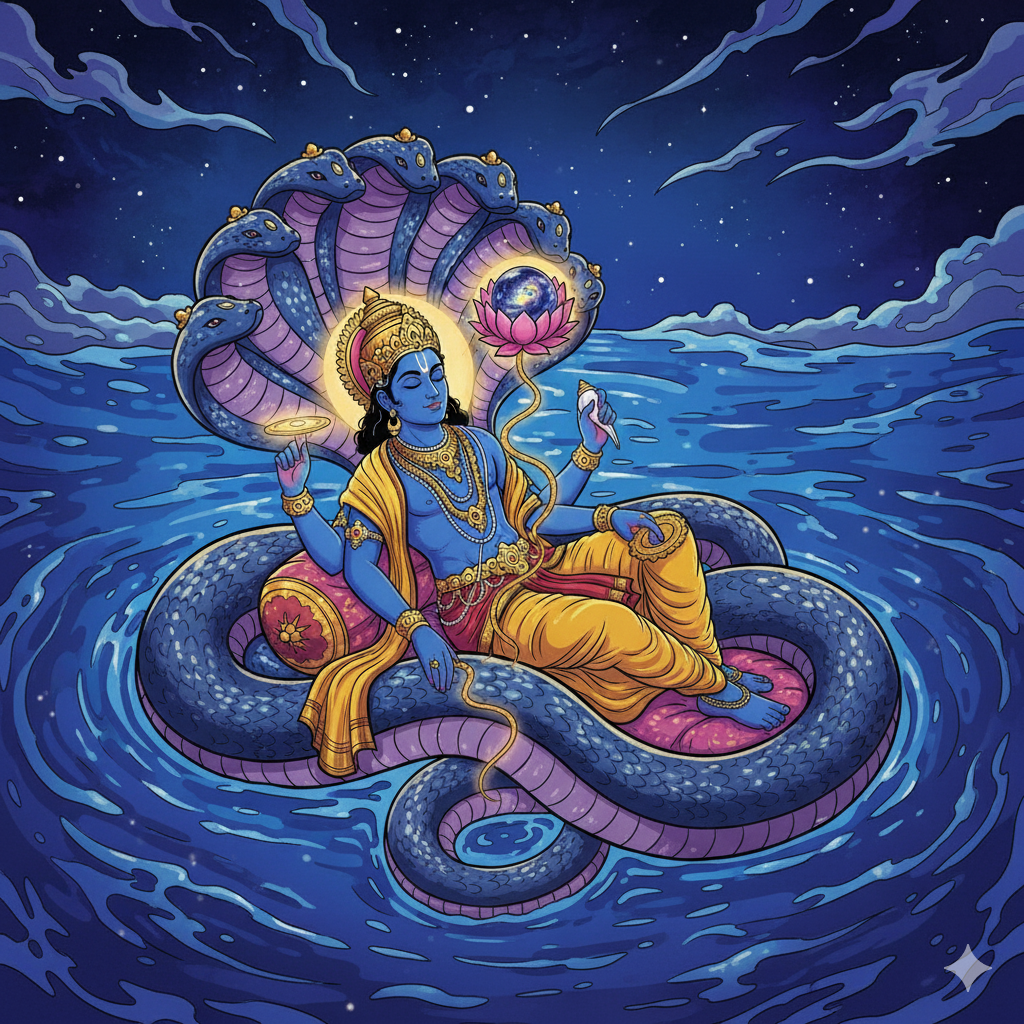
As Vishnu slept, a magnificent lotus stalk grew right from his navel, rising high above the cosmic waters. And on that lotus sat Lord Brahma, the four-faced creator, also in a deep meditation. He was the divine architect, holding in his mind the sacred blueprints for all of creation. Brahma was waiting for the signal to start his work, to weave the fabric of reality once more. The stage was set for a new cycle of existence. But peace, even a peace this absolute, is often just the calm before the storm.
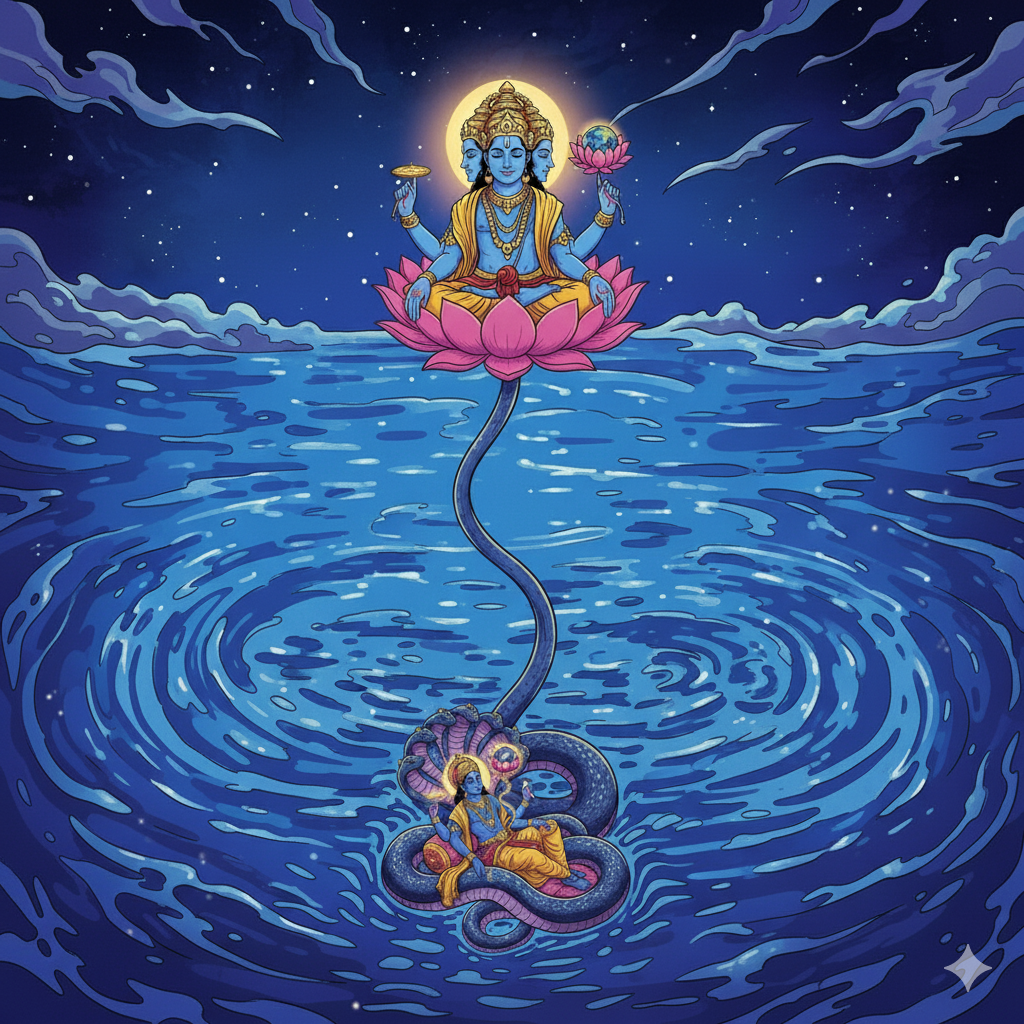
From Vishnu’s earwax, two beings of incredible power and terrifying form took shape. They were the Asuras, the demons, Madhu and Kaitabha.
Madhu and Kaitabha – The Birth of Chaos
Now, Madhu and Kaitabha weren’t your average demons. They came to personify the most fundamental forces of chaos. Madhu, whose name means honey, is often seen as the embodiment of tamas—the quality of darkness, inertia, and ignorance. Kaitabha, whose name suggests hardness, is seen as the embodiment of rajas—the quality of passion, ego, and aggression. They were born fully grown, immensely powerful, and filled with a blinding arrogance.
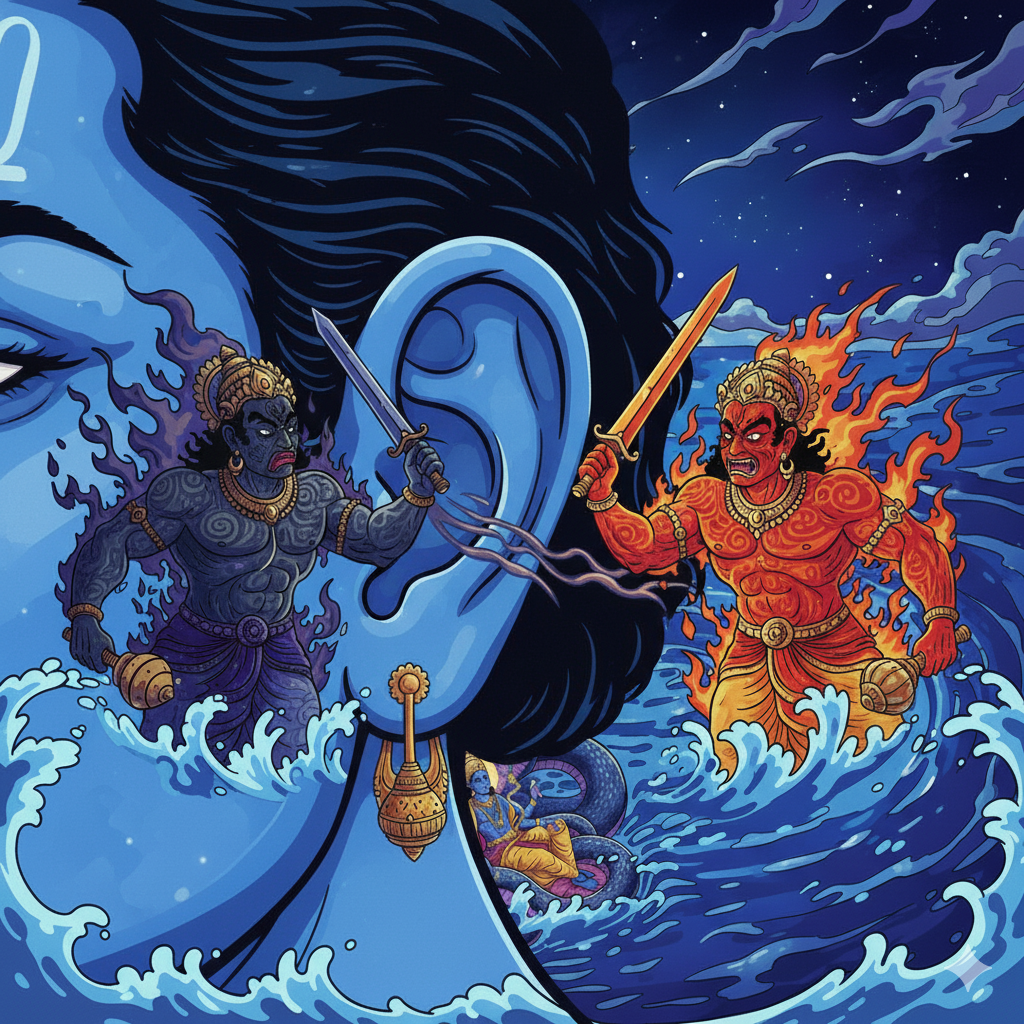
As they explored the endless ocean, they felt a desperate need to know where they came from. Their search for answers led them to perform a severe penance. They had heard the Vagbija mantra, and started meditating on the supreme feminine energy, the Adi Shakti, for a thousand years. Pleased by their devotion, the great Goddess granted them a powerful boon: they would only die when they themselves wished for it. This boon made them virtually immortal, and with this newfound power, their arrogance became truly boundless.
Their travels eventually led them to the lotus where Lord Brahma sat meditating. But when they saw the creator, they weren’t filled with reverence. They were filled with contempt. They roared with laughter at the serene figure. “Who are you, old man, sitting so high?” they challenged. “A being of strength and power should sit here, not some frail meditator!”
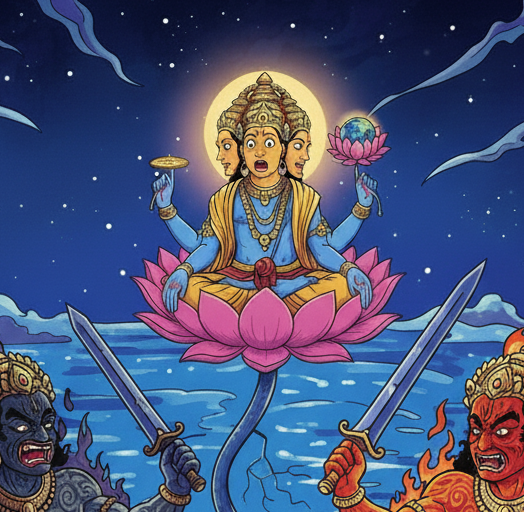
The Millennial War
Moved by Brahma’s desperate prayers, the Goddess Yoga Nidra slowly withdrew her power from Vishnu. The preserver’s eyes fluttered open. Seeing Brahma trembling, he immediately understood how dire things were. Without a word, he rose from his serpent bed, his form radiating a calm but immense power. He was ready for battle.
Vishnu confronted Madhu and Kaitabha. The demons, puffed up with pride from their boon and their victory over Brahma, just laughed at him. And so began a battle of truly epic proportions.
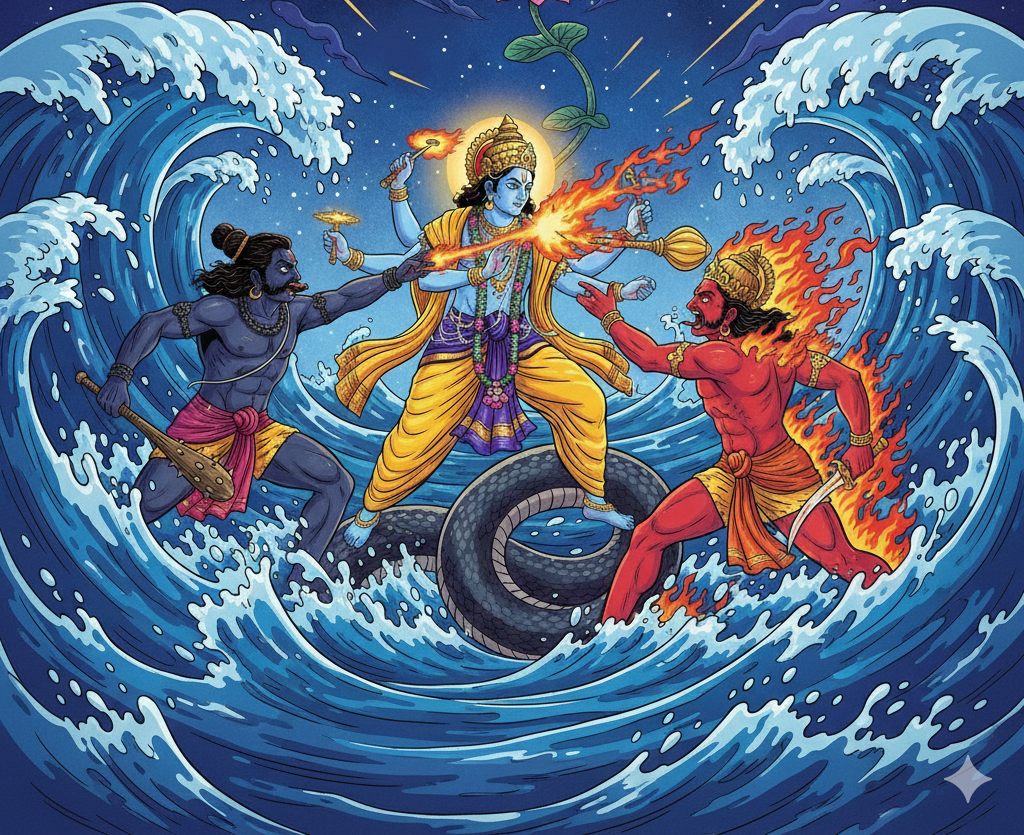
This wasn’t a war of days or months. For what is said to have been five thousand years, Lord Vishnu fought the two demons in the middle of the cosmic ocean. The clashes of their celestial weapons sent shockwaves through the primordial waters. It was a relentless struggle. Whenever Madhu grew tired, Kaitabha would fight, and when Kaitabha needed a break, Madhu would take over. They fought as a perfect, chaotic team, but Vishnu fought alone, without a moment of rest.
Even with all his divine power, Vishnu found himself at a stalemate. The boon from the Devi had made the demons almost invincible. They couldn’t be defeated by sheer force, and the long war began to wear on even the mighty preserver. After millennia of ceaseless combat, Vishnu realized he needed a different strategy. He understood this wasn’t just a battle of strength, but a test of wisdom. This was a war that couldn’t be won with weapons, but with intellect.
5000 Years Later
Vishnu battled the formidable demons Madhu and Kaitabha for five thousand years, but they showed no signs of tiring. Exhausted and perplexed, Vishnu pondered how to defeat them. Observing his fatigue, the demons gloated, offering him a choice: surrender or continue the fight, which they were certain to win. Vishnu, feigning a need for rest, proposed a truce, which the confident demons agreed to.
Taking a moment of respite, Vishnu realized the source of their power: a boon from Supreme Śakti Devī, granting them “Ichāmrityu,” or death at will. Knowing he couldn’t simply overpower them, he turned to the Devī, praising her and begging for help. He explained his predicament—he was tired, but they, empowered by her boon, were not.
The Devī appeared and promised to assist Vishnu in the fight.
Following the advice of the supreme Devi, who had guided him to this realization, Vishnu changed his tactics. He paused his attack. The clashing of weapons stopped, and an eerie silence fell over the cosmic ocean. At this moment, the Devi appeared and cast enchanting glances at the two demons, filling their hearts with pride and desire. Seeing them captivated, Vishnu seized his chance.
Then Vishnu did something completely unexpected. He started to praise them.
“O mighty Madhu and Kaitabha,” Vishnu’s voice boomed across the waters, “I am truly impressed. In all my existence, I have never faced warriors as powerful and relentless as you. Your strength is immeasurable, your courage unmatched. To fight for so long without yielding is a feat worthy of the highest praise.”
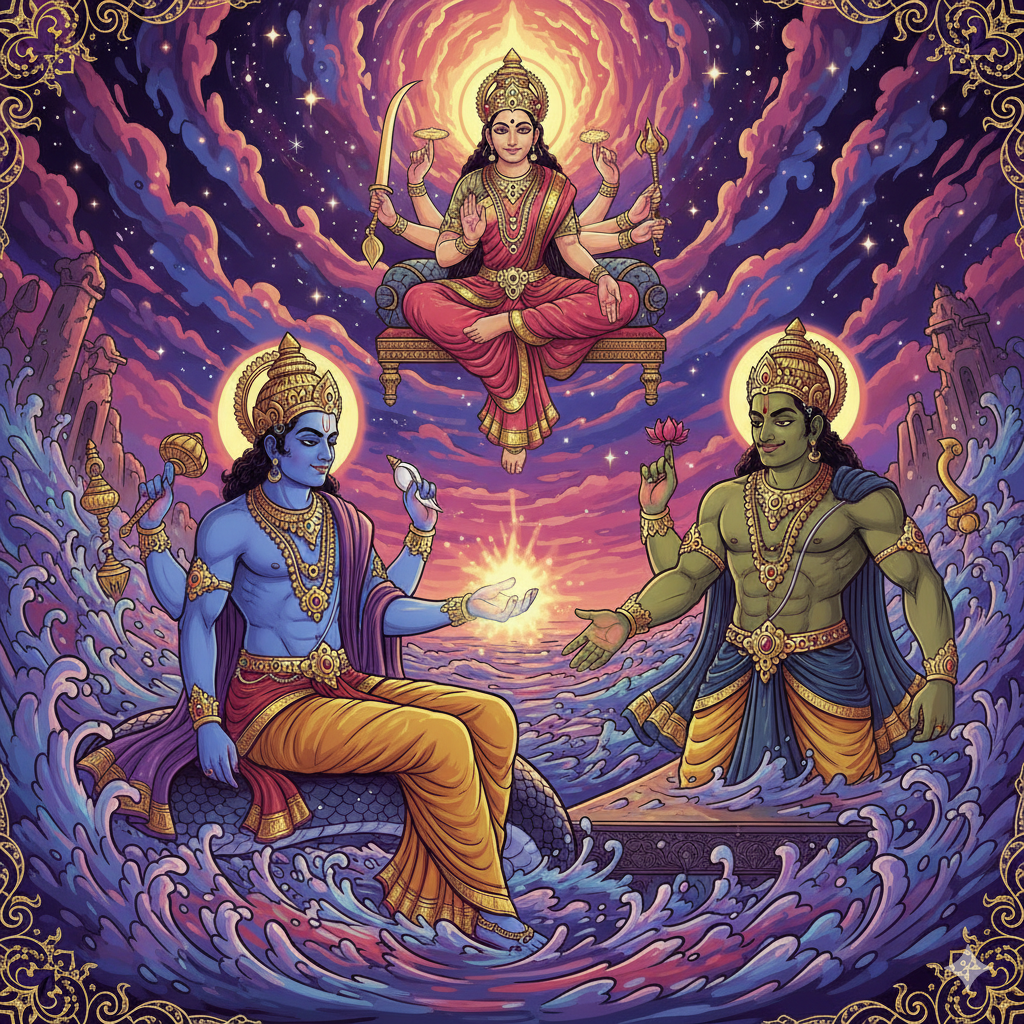
The Divine Trick
For beings like Madhu and Kaitabha, whose very existence was built on ego, this praise was completely disarming. They expected fear, anger, or surrender—not admiration. Their demonic hearts swelled with pride. They laughed, looking at each other with smug glee. This great god, Vishnu, was finally admitting they were superior. Besides, they were smitten by the Devi’s appearance and wanted to appear dominant.
In their monumental hubris, they decided to show off their generosity. “We are impressed with your persistence too, Vishnu!” they declared. “You’ve fought bravely, even though you couldn’t defeat us. Since we are the victors, we’re in a position to grant you a boon. Ask for anything you desire, and it shall be yours!”
This was the moment Vishnu had been waiting for. The trap was set, and the demons, blinded by their own pride, had walked right into it.
Vishnu’s expression remained calm, but his eyes held a glint of divine cunning. He replied, “O generous and mighty warriors, you are truly honorable. If you are so pleased with me that you would grant me a boon, then I ask for this: grant me the ability to slay you both.”
As soon as Vishnu said this, the Devi disappeared. The danavas came back to senses. Silence. The demons’ boastful laughter died in their throats. They were completely stunned, caught in their own web of arrogance. A promise of a boon is sacred and unbreakable. They couldn’t go back on their word. They had been masterfully tricked.
Still, they had some cunning left. They looked around at the endless, infinite ocean that was the entire universe. Realizing there was no land, no ground, nothing that wasn’t water, they thought they saw a loophole. Smirking, they believed they had outsmarted the god one last time. “Very well, Vishnu,” they proclaimed. “We will honor our word. You may slay us. But we add one condition: you must kill us in a place where there is no water.”
The Birth of Earth
They were confident that such a place didn’t exist. The universe was water. They were safe.
Vishnu simply smiled. He accepted their condition.
In that instant, Lord Vishnu began to expand his form. He grew larger and larger, his divine body stretching across the cosmos until it seemed infinite. He then raised his mighty thighs, which grew to an immense size, creating a vast, dry island rising high above the cosmic ocean. He looked down at the dumbfounded demons and said, “Here is a place with no water.”
Madhu and Kaitabha knew they were defeated. Trapped by their own words and their own pride, they had no escape. Fulfilling their promise, they laid their heads upon Vishnu’s enormous thighs. With a single, swift motion, Vishnu brought down his divine discus, the Sudarshana Chakra, and severed their heads, finally ending their reign of chaos.
The universe was saved, and the path to creation was now clear. But the story doesn’t end there. From the bodies of the slain demons, their fat and marrow—their medas—oozed out and spread across the cosmic ocean. This substance began to solidify, forming the vast lands of the Earth. It’s for this reason that our world is sometimes called Medini—that which is born from the medas of danavas. The very ground beneath our feet is a reminder that even from chaos and destruction, a new creation can rise.
So the tale of Madhu and Kaitabha is more than just an epic battle. It’s a story about the eternal struggle between order and chaos, wisdom and ego. It shows that arrogance is a trap we set for ourselves, and that even the most destructive forces can be transformed into the very foundations of a new world.
If you enjoyed this story, stick around for more incredible adventures from Indic puranas and folklore. You can read some amazing stories about serpent deities or Naagas in my book – NAAGA published by HarperCollins India.
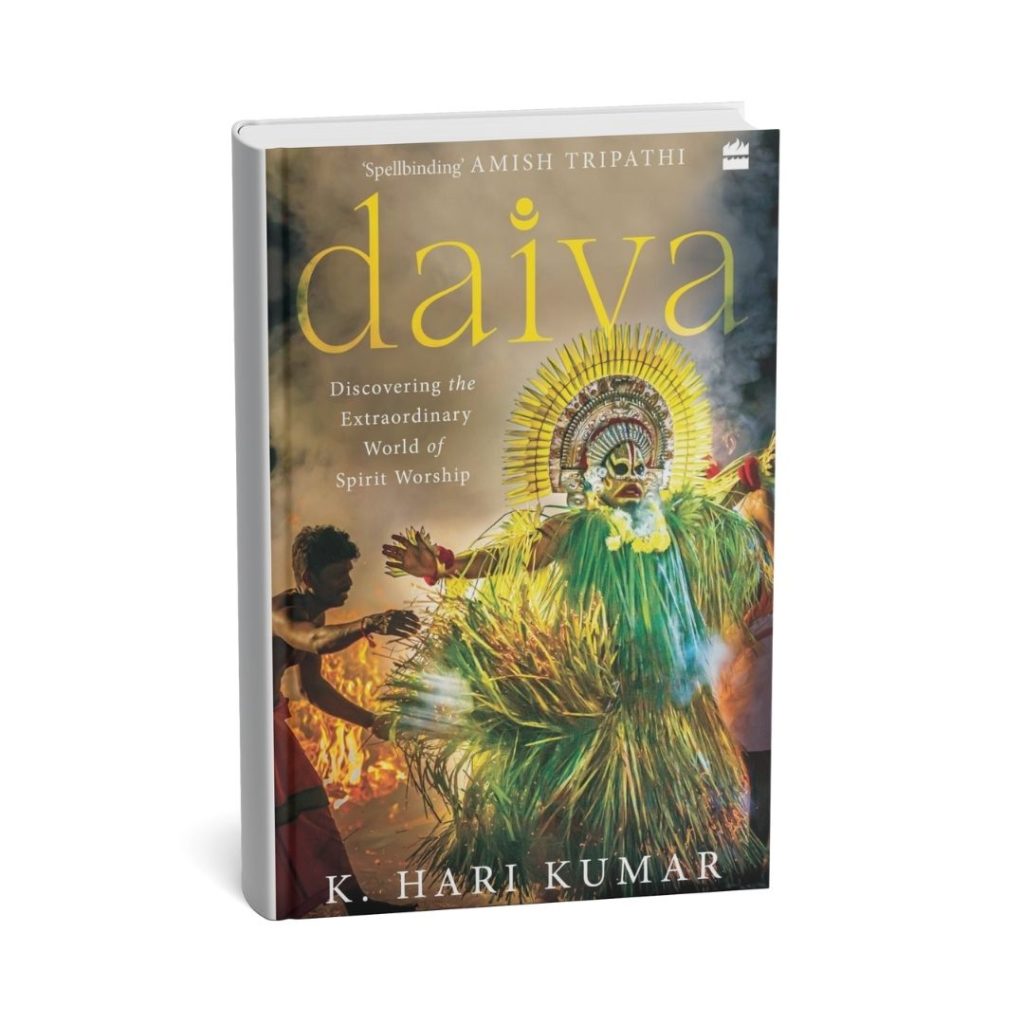
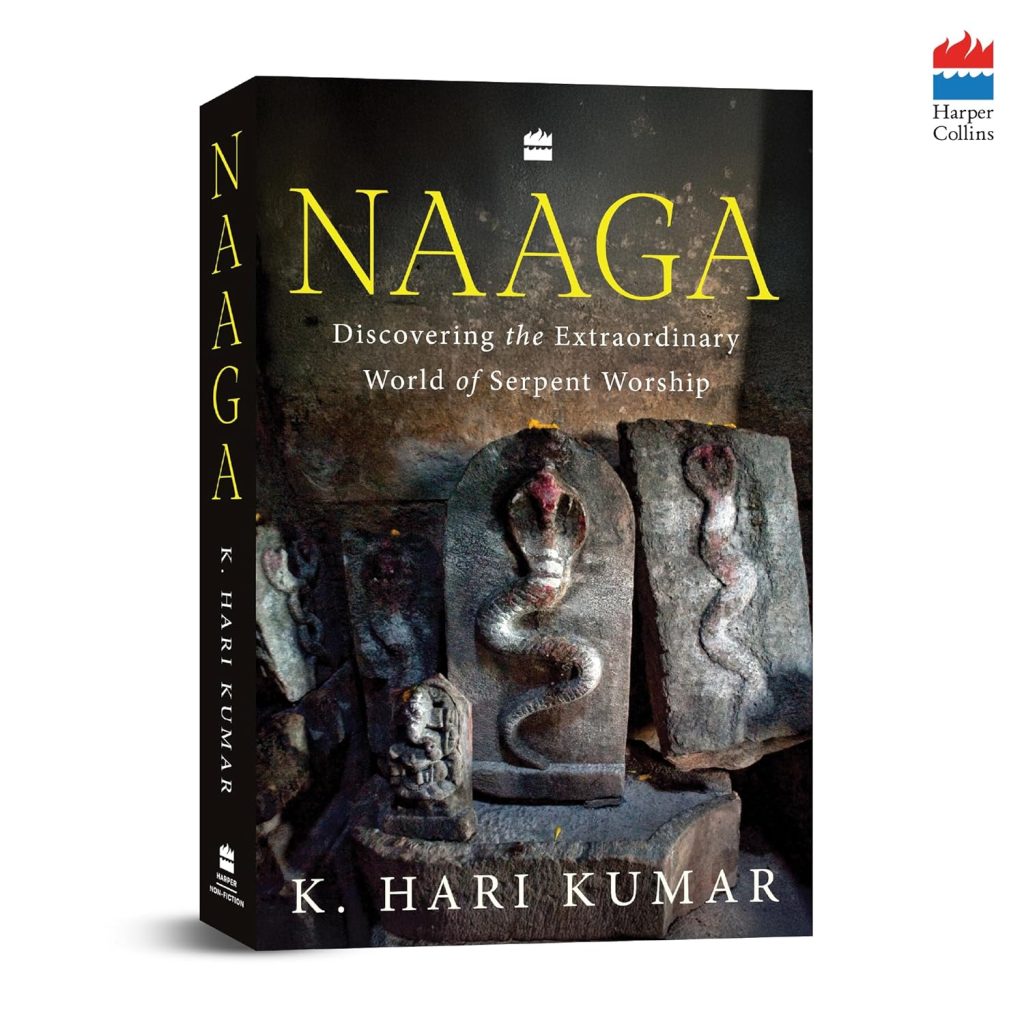

Leave a Reply